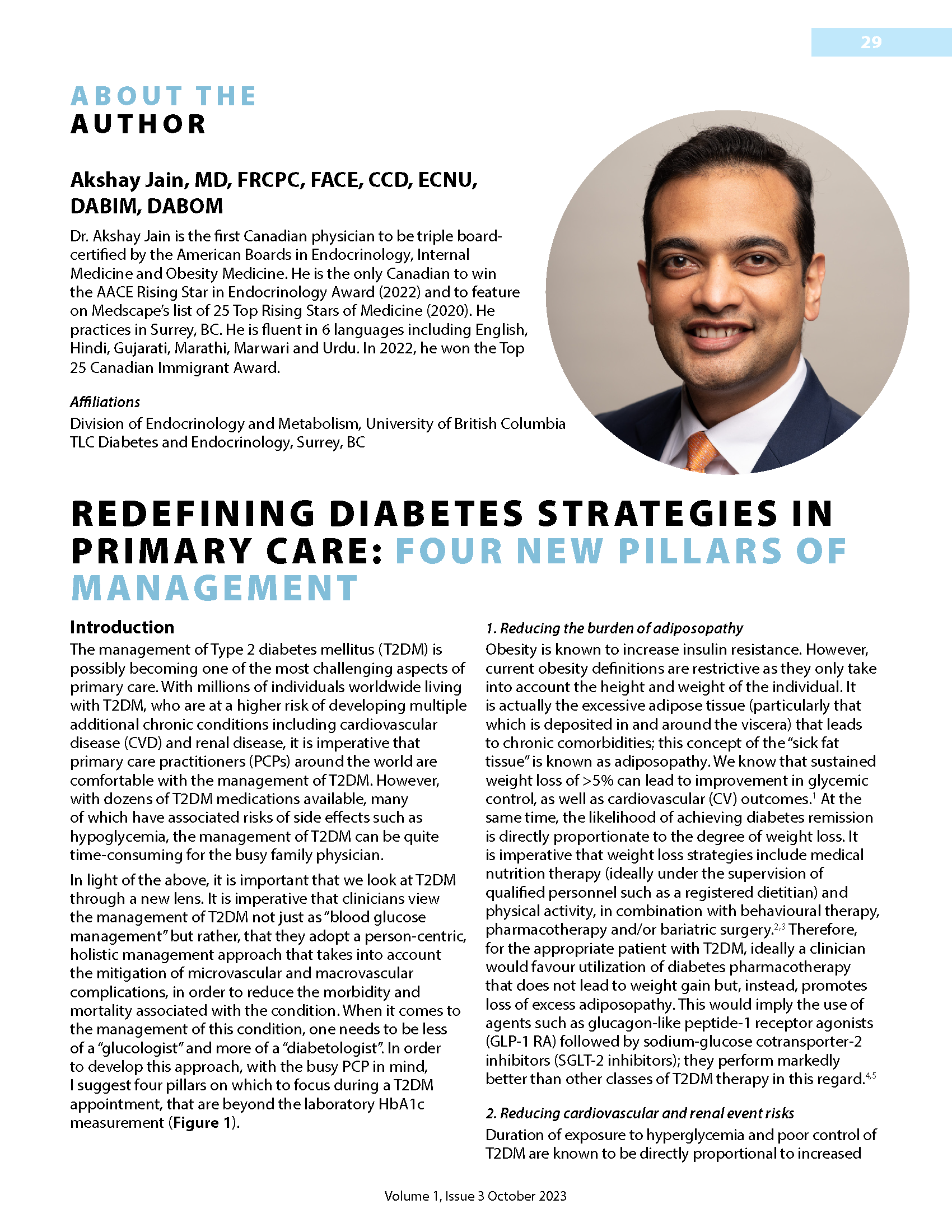Redefining Diabetes Strategies in Primary Care: Four New Pillars of Management
DOI:
https://doi.org/10.58931/cpct.2023.1322Abstract
The management of Type 2 diabetes mellitus (T2DM) is possibly becoming one of the most challenging aspects of primary care. With millions of individuals worldwide living with T2DM, who are at a higher risk of developing multiple additional chronic conditions including cardiovascular disease (CVD) and renal disease, it is imperative that primary care practitioners (PCPs) around the world are comfortable with the management of T2DM. However, with dozens of T2DM medications available, many of which have associated risks of side effects such as hypoglycemia, the management of T2DM can be quite time-consuming for the busy family physician.
In light of the above, it is important that we look at T2DM through a new lens. It is imperative that clinicians view the management of T2DM not just as “blood glucose management” but rather, that they adopt a person-centric, holistic management approach that takes into account the mitigation of microvascular and macrovascular complications, in order to reduce the morbidity and mortality associated with the condition. When it comes to the management of this condition, one needs to be less of a “glucologist” and more of a “diabetologist”. In order to develop this approach, with the busy PCP in mind, I suggest four pillars on which to focus during a T2DM appointment, that are beyond the laboratory HbA1c measurement.
References
Diabetes Canada Clinical Practice Guidelines Expert Committee; Wharton S, Pedersen SD, Lau DCW, Sharma AM. Weight Management in Diabetes. Can J Diabetes. 2018 Apr;42(Suppl 1):S124-S129. DOI: https://doi.org/10.1016/j.jcjd.2017.10.015
MacKay D, Chan C, Dasgupta K, Dominy C, Gagner M, et al; Diabetes Canada Clinical Practice Guidelines Steering Committee. Remission of Type 2 Diabetes: Diabetes Canada Clinical Practice Guidelines Expert Working Group. Can J Diabetes. 2022 Dec 1;46(8):753-61. DOI: https://doi.org/10.1016/j.jcjd.2022.10.009
Wharton S, Lau DC, Vallis M, Sharma AM, Biertho L, Campbell-Scherer D, et al. Obesity in adults: a clinical practice guideline. CMAJ. 2020 Aug 4;192(31):E875-91. DOI: https://doi.org/10.1503/cmaj.191707
Diabetes Canada Clinical Practice Guidelines Expert Commitee; Lipscombe L, Booth G, Butalia S, Dasgupta K, Eurich DT, et al. Pharmacologic Glycemic Management of Type 2 Diabetes in Adults. Can J Diabetes. 2018;42:S88-103. DOI: https://doi.org/10.1016/j.jcjd.2017.10.034
ElSayed NA, Aleppo G, Aroda VR, Bannuru RR, Brown FM, Bruemmer D, et al. Pharmacologic approaches to glycemic treatment: Standards of care in diabetes–2023. Diabetes Care. 2023 Jan;46(Suppl 1):S140-57. DOI: https://doi.org/10.2337/dc23-S009
Diabetes Canada Clinical Practice Guidelines Expert Committee; Lipscombe L, Butalia S, Dasgupta K, Eurich DT, MacCallum L, et al. Pharmacologic glycemic management of type 2 diabetes in adults: 2020 update. Can J Diabetes. 2020 Oct 1;44(7):575-91. DOI: https://doi.org/10.1016/j.jcjd.2020.08.001
Diabetes Canada Clinical Practice Guidelines Expert Working Group; Robinson DJ, Hanson K, Jain AB, Kichler JC, Mehta G, et al. Diabetes and Mental Health. Can J Diabetes. 2023 Jun;47(4):308-344. DOI: https://doi.org/10.1016/j.jcjd.2023.04.009
Beck RW, Bergenstal RM, Riddlesworth TD, Kollman C, Li Z, Brown AS, Close KL. Validation of time in range as an outcome measure for diabetes clinical trials. Diabetes Care. 2019 Mar 1;42(3):400-5. DOI: https://doi.org/10.2337/dc18-1444

Published
How to Cite
Issue
Section
License
Copyright (c) 2023 Canadian Primary Care Today

This work is licensed under a Creative Commons Attribution-NonCommercial-NoDerivatives 4.0 International License.
